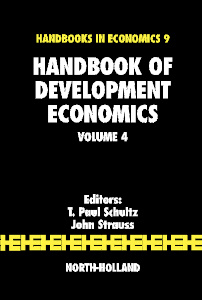Description
Handbook of Development Economics
Language: English
Subjects for Handbook of Development Economics:
Publication date: 03-2008
1054 p. · Hardback
1054 p. · Hardback
Description
/li>Contents
/li>Readership
/li>Biography
/li>Comment
/li>
The field of development economics has evolved since volume 3 of the Handbook of Development Economics was published more than a decade ago. Volume 4 takes stock of some of the newer trends and their implications for research in the field and our understanding of economic development.
The handbook is divided into four sections which reflect these developments, of which the first deals with agricultural and rural development. Section two is concerned with developments in the theory and evidence regarding public goods and political economy. The third section is focused on the behavior of households and individuals regarding various aspects of human capital investments, in the face of the various constraints, particularly market incentives and public goods. The final section contains papers that describe the different methods now available, both experimental and non-experimental, to conduct program evaluations, as well as describing papers that implement these methods.
The authors of the chapters are all experts in the fields they survey and extend, and this volume promises to be an invaluable addition to the Handbooks in Economics series and a useful reference to graduate students, researchers and professionals in the field of development economics.
The handbook is divided into four sections which reflect these developments, of which the first deals with agricultural and rural development. Section two is concerned with developments in the theory and evidence regarding public goods and political economy. The third section is focused on the behavior of households and individuals regarding various aspects of human capital investments, in the face of the various constraints, particularly market incentives and public goods. The final section contains papers that describe the different methods now available, both experimental and non-experimental, to conduct program evaluations, as well as describing papers that implement these methods.
The authors of the chapters are all experts in the fields they survey and extend, and this volume promises to be an invaluable addition to the Handbooks in Economics series and a useful reference to graduate students, researchers and professionals in the field of development economics.
1. Economic Development and the Decline of Agricultural Employment
2. Information Networks in Dynamic Agrarian Economies
3. Public Action for Public Goods
4. Understanding Political Corruption in Low Income Countries
5. Household Formation and Marriage Markets
6. Population Policies, Fertility, Women's Human Capital, and Child Quality
7. Health Economics for Low Income Countries
8. Health over the Life Course
9. Schooling in Developing Countries: The Roles of Supply, Demand and Government Policy
10. The Impact of Child Health and Nutrition on Education in Less Developed Countries
11. Child Labor
12. Extended Family and Kinship Networks: Economic Insights and Evolutionary Directions
13. Evaluating Anti-Poverty Programs
14. Evaluating Social Programs with Endogenous Program Placement and Selection of the Treated
15. Using Randomization in Development Economics Research: A Toolkit
16. Evaluating Conditional Schooling Health and Health Programs
2. Information Networks in Dynamic Agrarian Economies
3. Public Action for Public Goods
4. Understanding Political Corruption in Low Income Countries
5. Household Formation and Marriage Markets
6. Population Policies, Fertility, Women's Human Capital, and Child Quality
7. Health Economics for Low Income Countries
8. Health over the Life Course
9. Schooling in Developing Countries: The Roles of Supply, Demand and Government Policy
10. The Impact of Child Health and Nutrition on Education in Less Developed Countries
11. Child Labor
12. Extended Family and Kinship Networks: Economic Insights and Evolutionary Directions
13. Evaluating Anti-Poverty Programs
14. Evaluating Social Programs with Endogenous Program Placement and Selection of the Treated
15. Using Randomization in Development Economics Research: A Toolkit
16. Evaluating Conditional Schooling Health and Health Programs
The Handbook is a definitive reference source suitable for use by professional researchers, advanced graduate students, or by those seeking a teaching supplement.
T. Paul Schultz, Malcolm K. Brachman Professor at Yale, has written and edited books, a textbook, and articles on microeconomics of individual and family behavior in development, including labor supply, fertility, marriage, production of health, investments in children, including nutrition, schooling, migration, with a focus on gender inequalities.
John Strauss has over 25 years of research and survey experience in the developing world, spanning sub-Saharan Africa, Latin America and Asia. His research focus is on health and other human resource investments, their determinants and interaction with labor markets. He was a co-contributor to Volume 3A of the Handbook of Development Economics. He has been the PI of the Indonesia Family Life Survey (IFLS) for waves 3 and 4 (2000 and 2007) and is a co-PI of the China Health and Retirement Longitudinal Study (CHARLS. He is Editor in Chief of Economic Development and Cultural Change.
John Strauss has over 25 years of research and survey experience in the developing world, spanning sub-Saharan Africa, Latin America and Asia. His research focus is on health and other human resource investments, their determinants and interaction with labor markets. He was a co-contributor to Volume 3A of the Handbook of Development Economics. He has been the PI of the Indonesia Family Life Survey (IFLS) for waves 3 and 4 (2000 and 2007) and is a co-PI of the China Health and Retirement Longitudinal Study (CHARLS. He is Editor in Chief of Economic Development and Cultural Change.
- Presents an accurate, self-contained survey of the current state of the field
- Summarizes the most recent discussions in journals, and elucidates new developments
- Although original material is also included, the main aim is the provision of comprehensive and accessible surveys
© 2024 LAVOISIER S.A.S.




